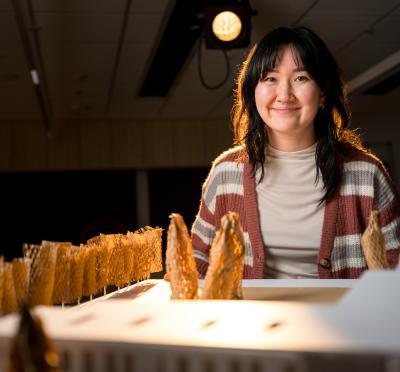Americans spend about 90 percent of their lives indoors, on average. Our quality of life is shaped, to a large extent, by the qualities of the buildings we inhabit. To address the challenges of constructing more appealing, resilient, and efficient buildings, projects need engineers who excel within a diverse team of professionals.
“As buildings have become more complicated, everyone on the project has become more specialized,” said Judy Liu, professor of structural engineering. “There’s a need for someone who understands all of the disciplines and who can reach across them, so the process can be integrated and streamlined.”
Beginning in winter term 2019, Oregon State University’s College of Engineering took steps to address that need by offering a bachelor’s degree in architectural engineering (AE). ABET, the accreditation organization for engineering programs in the United States, lists only 20 schools that offer a degree in architectural engineering. The Oregon State program is the second west of the Rockies, the only in the Pacific Northwest, and complements existing regional architectural degree offerings.
“It’s a pioneering effort for Oregon State,” said Robert Bergstrom, former Oregon State instructor of heating, ventilation, and air conditioning technology. “The role of the architectural engineer is clearly important when you think about how complex buildings are and what an important role they play in American life.”
According to the Architectural Engineering Institute, architectural engineers practice in the space where engineering and art meet. They work with architects and civil engineers but are unique, both in their skills and in the role they play in the building design team.
“The architectural engineering program leverages a lot of the elements of civil engineering and construction engineering management, which are already very strong at this school,” said Joe Fradella, senior instructor, Hoffman Instructor, and AE program committee member. “It brings a new dimension, which we haven’t yet had in this region.”
The program will provide students with breadth and depth in a handful of areas, including structural systems; heating, ventilation and air conditioning systems; electrical and lighting systems; and construction engineering and management. And, since buildings consume nearly 40 percent of national energy, architectural engineers have a large opportunity to reduce energy consumption by increasing the efficiency of building systems.
“If you like architecture but you’re more technically oriented, then this may be the major for you,” Liu said. “You enable the architect’s vision by designing the structure to span large, open spaces, or the lighting to meet the functional needs of the occupants as well as the desired aesthetics.”
The AE committee developed the curriculum based on a survey of current architectural engineering programs, a review of existing courses and curricula, and a comparison to ABET accreditation requirements. “I completed an architectural engineering program at another school,” Fradella said. “While it was a good program, I’ve tried to take what I’ve learned since then and make this new one special — and make it pop.”
Both industry partners and students have expressed interest in the program in the last two years of planning and development.
“This program is a great way for students to bridge their knowledge and understanding, and integrate concepts and coursework,” said Jeff Thiede, president of On Electric Group/MDU Construction Services Group and a member of the Construction Education Foundation. “It can help them prepare to integrate their work with the entire scope of design and construction disciplines when they graduate.”
In the lead-up to its debut, about 20 students have spoken with academic advisors about transferring into the new program.
“If you like architecture but you’re more technically oriented, then this may be the major for you.”
“The most rewarding part of the program for me is that I will study with a wide variety of students,” said student Aubrey Collins, who plans to be part of the first AE cohort. “As an architectural engineering student, I will have the option to acquire a more diverse range of skills that I can share with so many different people when I graduate and start my career.”
– Johanna Carson, Momentum, Spring 2019




